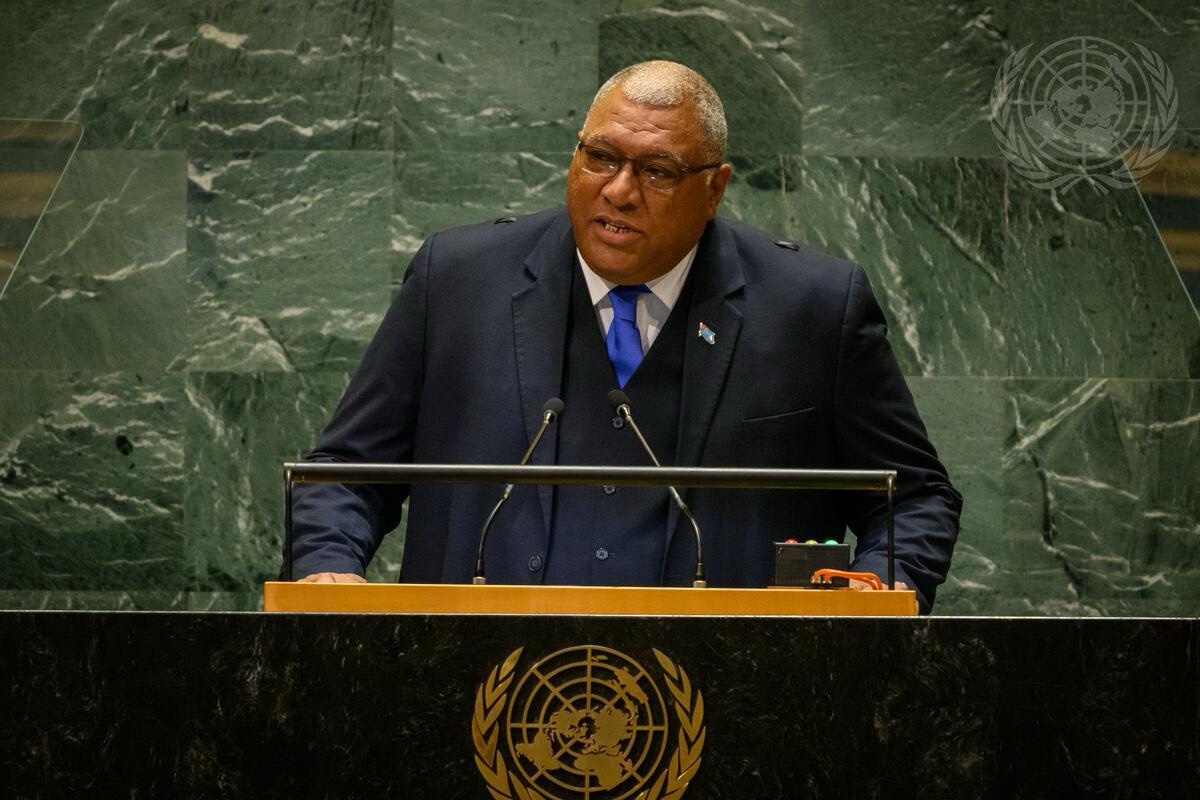Fiji’s President, Ratu Wiliame Katonivere, delivered a stinging rebuke to China’s recent ballistic missile test in the Pacific, calling for an end to provocative actions that threaten peace and security.
Speaking at the 79th United Nations General Assembly (UNGA) on 26 September in New York, President Katonivere condemned the test, which took place just a day prior.
“There was a unilateral test firing of a ballistic missile into the Pacific Ocean.
“We urge respect for our region and call for cessation of such actions,” Katonivere declared, invoking the “Ocean of Peace” principles endorsed by Pacific leaders to uphold international law and peaceful coexistence.
“Our statements reinforce the Pacific’s peaceful example, and we urge others to refrain from actions that undermine peace and security in the Blue Pacific,” he stressed.
The President’s address was a mix of firm geopolitical criticism and a call for urgent global action on climate change.
Representing one of the world’s most climate-vulnerable nations, President Katonivere’s speech was a stark reminder of the challenges Small Island Developing States (SIDS) face in a rapidly warming world.
“Climate change. Sea-level rise. Pandemics. Poverty. Unsustainable development. Conflicts. Inequalities. The challenges are daunting,” Katonivere told world leaders.
He highlighted the theme of the session, “Unity in diversity, for the advancement of peace, sustainable development, and human dignity,” as not only relevant but essential in today’s fragmented global landscape.
As a leader from a Small Island Developing State (SIDS), Katonivere placed the climate crisis at the centre of his address.
He highlighted the devastating impact of climate-induced disasters on vulnerable Pacific communities, making a firm demand for stronger international cooperation and accelerated action.
“By 2050, around 240 of our coastal communities will be displaced due to sea-level rise. Forty-two are in urgent need of relocation,” he warned, painting a dire picture of Fiji’s climate reality.
“With the limitations of the multilateral climate financing architecture, Fiji has established the world’s first national Relocation Trust Fund to support our relocation costs.
“We have issued domestic and international green and blue bonds, piloted low-cost parametric insurance products for rural communities, and engaged the private sector in climate resilience building.
“We call on our development partners to support our efforts,” he said.
He called for deep, rapid, and sustained reductions in greenhouse gas emissions, stressing the need to meet the 1.5°C target to avoid catastrophic consequences.
President Katonivere also urged the global community to phase out coal and transition away from fossil fuels, aligning energy systems with net-zero targets by 2050.
On the economic front, Katonivere celebrated the adoption of the Multidimensional Vulnerability Index (MVI), a crucial step in addressing the unique challenges faced by SIDS.
He urged for the index to be mainstreamed into global policy and practice, allowing SIDS to access much-needed funding for climate adaptation and resilience building.
“We don’t have the luxury of time nor can we justify inaction,” he emphasised, calling for quick mobilisation of funds for recovery and reconstruction efforts.
President Katonivere reinforced Fiji’s commitment to multilateralism, stating that the country will continue to work closely with the United Nations and Member States to uphold human rights, foster global cooperation, and promote peace.
“We now live in an age of distrust,” he remarked, acknowledging the growing disconnect between people’s expectations and the global governance system’s response.
He called for a collective effort to counter misinformation and rebuild trust, which he said is the bedrock of effective multilateralism.
As world leaders prepare for the upcoming COP climate summit in Baku, President Katonivere made a pointed call for unity in tackling the climate crisis.
“Deep, rapid, and sustained reductions in greenhouse gas emissions must be vigorously pursued,” he said, urging nations to finalise climate finance goals and address glaring gaps in funding for both adaptation and mitigation.
He also highlighted Fiji’s leadership on global ocean governance, including its commitment to the UN Convention on the Law of the Sea and the upcoming ratification of the Agreement on Biodiversity Beyond National Jurisdiction (BBNJ).
President Katonivere also reaffirmed Fiji’s unwavering commitment to global peace, climate action, and multilateralism.
“The world deserves a future of peace, dignity, and prosperity. It is never too late,” he urged.














